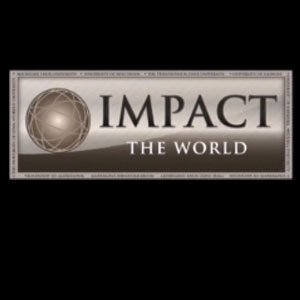BTN.com staff, January 4, 2012
The network rings in the New Year with a powerful new eight-part series, Impact The World, which will showcase some of the incredible Big Ten breakthroughs that are changing lives in the United States and around the world. Host Dennis Haysbert will unveil the stories that demonstrate how these advances impact each of us and the world in which we live. The new series debuts at 9:30 PM ET on Tuesday, Jan. 10 and will air on Tuesdays throughout the winter.
The first of the eight-episode series will highlight how three Big Ten universities are impacting the world by providing world-class treatment for recovering patients.
- Indiana University?s 2,500-acre outdoor recreational facility doesn?t look or feel like a hospital, but has served as the backdrop for hours of healing, thanks to some very special horses. IU?s two equine-assisted therapy programs, Horseshoes for Hope and Horses for Heroes, helps disabled children and veterans, respectively, on the road to recovery. While working with specially trained horses, the programs help improve self-control, encourage teamwork and bolster confidence and self-esteem for veterans with post-traumatic stress disorder as well as children affected by autism, down syndrome, cerebral palsy, multiple sclerosis, sickle cell anemia and many other conditions. The horse therapy has helped 13-year-old Parker Eaton, who is autistic, improve her communication skills and Iraq war veteran Justin Inabinette deal with post-traumatic stress disorder.
- The University of Illinois has always been at the forefront of innovations for students with disabilities, being the first to offer wheelchair-accessible residence halls, buses and bus routes. And in 1948, Illinois became the first university to start an athletic program for students with disabilities while uniting a group of World War II veterans to organize the National Wheelchair Basketball Association. Wheelchair basketball is credited with helping influence the disability sports movement and spread wheelchair basketball around the world. Illini junior Megan Blunk was a victim of a car accident at the age of 19 and through participation in the Illini wheelchair basketball team, has learned that her wheelchair does not define her. Today, Illinois continues to develop new racing chairs in its effort to foster wheelchair athletics. The university also recently completed a new residence hall for paraplegics, named in honor of Dr. Timothy Nugent, the program?s founder.
- Thought control, the phenomenon of moving objects with the mind, is usually reserved for the realm of science fiction. But researchers at the University of Minnesota are blurring the lines between fantasy and reality. Creating a technology called Brain Computer Interface, researcher Dr. Bin He is seeking to medical advances in the areas of prosthetics and epilepsy. Driven by human thought, the program uses electrodes to measure brainwave activity, which is then digitized and interpreted by a computer to create virtual movement on a computer screen. Ultimately, Dr. He hopes the non-invasive technology will enable patients to move prosthetic limbs by thought and help epilepsy patients control seizures.
The second of the eight-episode series will spotlight three inspirational stories of the Big Ten?s outreach and impact in Africa. The episode will air at10:30 PM ET on Tuesday, Jan. 17.
- In Kenya, the effects of HIV and AIDS are devastating, and health care is very difficult to access. Indiana University is changing that through one of largest, most comprehensive and innovative HIV/AIDS control programs in the world, treating hundreds of thousands of HIV-positive patients in western Kenya while providing students an opportunity to spend time in the developing world, reinforcing the altruistic spirit of medicine. Called the Academic Model Providing Access to Healthcare, or AMPATH, the program has been featured in the Wall Street Journal, National Public Radio, BBC and other international media and has been nominated multiple times for the Nobel Peace Prize. AMPATH is a consortium of North American academic health centers led by Indiana University and including schools such as Duke, Brown, Purdue and Toronto working in partnership with Moi University School of Medicine and Moi Teaching and Referral Hospital in Eldoret, Kenya. This partnership, formed in 1989, has evolved to include care to individuals with cancer and diabetes, life-saving services to mothers and babies, ground-breaking health research, and educational opportunities for students and health care providers on both continents. Faculty and medical students share amazing stories of conquering unbelievable odds to help save lives in these impoverished communities.
- Purdue University Professor Gebisa Ejeta is a native Ethiopian who lived in a hut and was schooled in a one-room classroom. But his mother had bigger dreams, sacrificing much to send her son to boarding school before he crossed the Atlantic to attend Purdue. There, he researched the sustainability of sorghum, eventually winning the 2009 World Food Prize, the agricultural equivalent to the Nobel Prize, for his research leading to improved sorghum varieties in his native Ethiopia and other African nations. The drought- and disease-resistant hybrid of the Ethiopian grain Ejeta developed is credited with saving thousands and will prove instrumental in fighting hunger for more than 500 million people on the African continent.
- As the largest of 250 chapters of Engineers Without Borders (EWB) USA, the University of Wisconsin sends students and engineers around the globe to operate engineering projects for people in need. In 2003, a devastating landslide severed the main water pipeline in Muramba, Rwanda, drastically altering the community?s access to clean water. The team spent months repairing the pipeline and developing new water sources for Muramba. Over five years, Wisconsin?s EWB also helped build a canal crossing, expanded the town?s health clinic, and teamed with farmers to create more efficient plots for crops. Students further the ?Wisconsin Idea,? put forth over 100 years ago, that knowledge should serve to fulfill the needs and aspirations of people.







